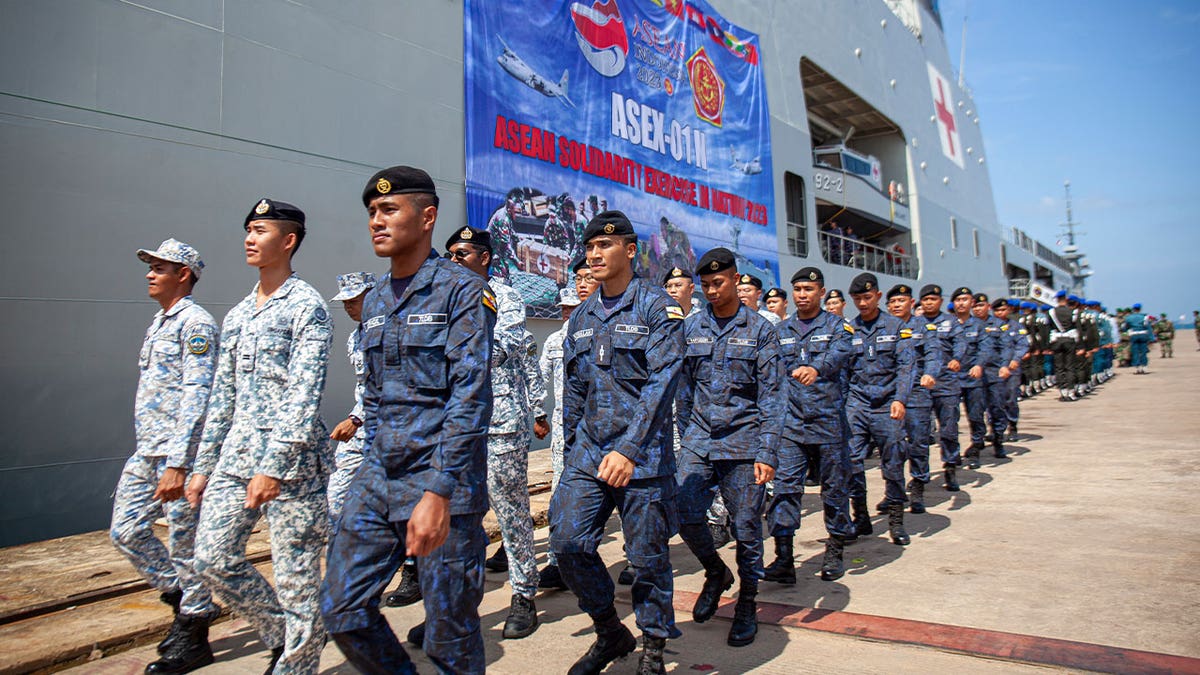The Association of Southeast Asian Nations (ASEAN) commenced its inaugural joint naval exercise on Tuesday, amidst mounting concerns amongst member countries regarding China’s increasing assertiveness in the region.
Dubbed the ASEAN Solidarity Exercise, these non-combat drills, as explained by Indonesian military chief Adm. Yudo Margono, include joint operations for maritime patrols, search and rescue, as well as humanitarian and disaster relief efforts.
The five-day exercise in Indonesia’s Natuna waters aims to strengthen military bonds among ASEAN nations, foster interoperability, and involve civilian groups engaged in humanitarian relief and disaster prevention.
US, JAPAN, AND AUSTRALIA TO CONDUCT JOINT MILITARY DRILLS IN DISPUTED SOUTH CHINA SEA: REPORT
While ASEAN nations have participated in naval exercises with other countries, including the United States and China, the current drills are the first conducted solely within the bloc and are widely interpreted as a signal to China.
China’s “nine-dash line,” a demarcation used to assert its claim over most of the South China Sea, has generated tense confrontations with rival claimants Vietnam, Malaysia, Brunei, and the Philippines. Chinese fishing boats and military vessels have become increasingly aggressive in the disputed waters.
This demarcation also overlaps with a section of Indonesia’s exclusive economic zone, encompassing the Natuna Islands. Initially planned for the North Natuna Sea, which lies on the edge of the South China Sea and represents a fault line in the rivalry between the US and China, the exercises were relocated by Indonesia, the current rotating chair of ASEAN, to the South Natuna Islands in an apparent effort to avoid provoking China.

Singapore and Brunei Navy personnel march during an opening ceremony of a military non-combat exercise called ASEAN Solidarity Exercise in Indonesia on Sep. 19, 2023. (AP Photo/Andaru Kz)
Though China and ASEAN signed a nonbinding accord in 2002 urging rival claimants to avoid aggressive actions that could lead to armed conflicts, including the occupation of barren islets and reefs, violations have persisted.
China’s militarization of the strategic South China Sea has drawn significant criticism. However, China maintains its right to develop and safeguard territories at any cost.
Adm. Margono stated, “Those engaged in exploration or activities in the area must respect state territories,” emphasizing the regulations outlined in the United Nations Convention on the Law of the Sea, after an opening ceremony for the exercise attended by ASEAN military leaders on Batam island near Singapore.
US ADMIRAL SAYS CHINA FULLY MILITARIZED ISLES IN SOUTH CHINA SEA
When asked if ASEAN’s joint naval exercise represents a stronger message against China’s territorial claims in the South China Sea, Adm. Margono replied, “We have adopted a firm stance.”
He also informed reporters that ASEAN has agreed to conduct military exercises annually, with plans to expand them in the future to encompass comprehensive war drills involving the army, navy, and air force.
While Indonesia and China generally enjoy positive relations, Jakarta has expressed concerns over what it perceives as Chinese encroachment in its exclusive economic zone within the South China Sea. Chinese coast guard vessels and fishing boats operating in the region have raised alarms in Jakarta, leading to a large-scale drill conducted by the Indonesian navy in July 2020 around the Natuna waters.
CLICK HERE TO GET THE FOX NEWS APP
Although Indonesia officially maintains a non-claimant stance in the South China Sea, it renamed a portion of it as the North Natuna Sea in 2017 to reinforce its belief that the area, which includes natural gas reserves, falls within its exclusive economic zone. The Philippines has also designated a part of its territorial waters as the West Philippine Sea.
Vietnam, one of the four ASEAN claimant states, has openly expressed concerns regarding China’s transformation of seven disputed reefs into artificially built islands, some of which feature runways and weapons systems, resembling small fortified cities.
In contrast, two ASEAN members, Cambodia and Laos, both aligned with China, have opposed the use of strong language against Beijing in the territorial disputes.
Denial of responsibility! Vigour Times is an automatic aggregator of Global media. In each content, the hyperlink to the primary source is specified. All trademarks belong to their rightful owners, and all materials to their authors. For any complaint, please reach us at – [email protected]. We will take necessary action within 24 hours.


